Zoo Visits, Crowns, and Family Emergencies, Melissa Studdard’s Dear Selection Committee and Setting Boundaries in the Lit World
- At June 12, 2022
- By Jeannine Gailey
- In Blog
 1
1
Zoo Visits, Crowns, and Family Emergencies
This week felt stressful. Glenn’s parents (who are yes, vaccinated) tested positive for Covid, and his father was in the hospital for related heart issues. It’s very hard to be far apart when your loved ones are going through health crises. Glenn’s brother did a great job of keeping us informed, but it reminded us both that living far from your parents can be stressful and it’s hard when you can’t help.
I also had a long dental appointment – I was supposed to get three crowns in one morning, two of them from root canals from the previous two years – it ended up, thankfully, only being two crowns – and we decided to spend an hour or so the day before at the Zoo in a brief window of “no rain,” where they’d recently re-opened an exhibit that had been closed for two years during the pandemic, the butterfly house. The birds were all off display because of the threat of Avian flu – a bit of a metaphor for our own pandemic, right? I’m really off-exhibit right now? But we had a chance to see the snow leopards, who don’t always make such nice appearances for us. Spending a few moments admiring the beauty of butterflies and snow leopards was an excellent stress-reliever. The rain came back the next day and has stuck around, it feels like, forever.
- Swallowtail and Yellow Flowers
- Swallowtails on Evergreen
- Another type of Swallowtail
Melissa Studdard’s Dear Selection Committee
Had the pleasure of reading Melissa Studdard’s new book from Jackleg Press, Dear Selection Committee. This is a book of exuberant, joyful, and heck, sexy and fun poems set into the framework of applying for a very specialized kind of job. Some poems are heartbreaking, taking on contemporary tragedies. It’s an inspiring book, too, making me want to write for the first time in ages.
Here’s a short excerpt from “My Kind,” the opening poem: “I am my own kind. I’ll learn to play piano. Like Helene Grimaud, / I’ll see blue rising from the notes. I’ll be an amateur bird watcher,/ a volunteer firefighter, a gourmet chef, a great/ humanitarian. I’ll plant a prize-winning garden,/ grow a pot farm. My hair is on fire. I’m running/ out of time.” The cover art by Karynna McGlynn is also amazing.
 Setting Boundaries in the Lit World (Is Hard)
Setting Boundaries in the Lit World (Is Hard)
I’ve been writing an essay for an anthology on “Self Care for the Disabled and Chronically Ill Writer.” Writing this essay has made me start to think about drawing more boundaries around my life, especially around unpaid labor. Since I started living life as a creative writer, I’ve been writing book reviews, blurbs, writing recommendation letters, volunteering on boards of lit mags, as the editor of lit mags, served as Redmond’s Poet Laureate (paid, but barely), taught at an online MFA program (again, paid, but barely), run youth programs for creative writing, hosted readings, and just given advice to strangers at random when they asked for twenty years. Twenty years!
Some of these things brought/bring me real joy – I still get a thrill out of introducing young people to the kind of fun poetry they’ve never experienced – but other parts, I fear, have started to not bring joy. I’ve talked, in my book PR for Poets, and on this blog, about the idea of writing karma – that we give back what we can when we can in the hopes that the good energy would come back around.
As someone with limited energy and time, I have to start setting boundaries in the lit world – when to say no, when to say yes. I’ve also realized that writing friendships, though sometimes requiring more energy, are something essential to keeping me going when I get discouraged, so I want to spend more energy on the friendships that are actually mutually beneficial (because, let’s be honest, they aren’t all mutually beneficial). I’m not a person who likes to set limits or say no. But this is part of self care. I cannot give and give forever. And as someone with expensive dental care (see above) and medical care (try having MS sometime – it’s super expensive), I may need to focus a bit more on work that pays more than “almost nothing.” These are hard decisions. But protecting your time – if you are a chronically ill and/or disabled writer – is one of the most important things you can do for your writing. If you’re worn out by unpaid labor, you are not as likely to write your best work or have the energy to promote it. So choose you. (This is really hard, especially for those of us with people-pleasing tendencies.) As I get older, I want to claim my time more. We do not have forever – choose the things that are really at the top of your priority list. Spending time at the dentist or doctor or testing or physical therapy – while not my favorite things – are necessary evils, and they already take away time from family, fun, writing, and things like spending time regenerating your soul with butterflies. When I consider how my light is spent, as someone wise once said.
Three New Poems in Bourgeon, How to Cope with a Rough Week, Talking Publicity Efforts and Finishing Up Manuscripts and Other Poetry Things
- At June 05, 2022
- By Jeannine Gailey
- In Blog
 2
2
 Three New Poems in DC-based Bourgeon
Three New Poems in DC-based Bourgeon
I want to start with a thank you to DC-based Bourgeon, a new literary journal, for publishing three brand new poems from me, “A Woman Turns Fifty with Cherry Blossoms,” “Cassandra Reminds Us the Spring,” and “Dating Profile” (which, warning, is a little spicy.) Here’s a link to read them all.
Sneak peek of one of the poems below:
 How to Survive a Rough Week
How to Survive a Rough Week
So this week has been a little rough, with more shootings, I’ve been struggling with a never-ending sinus/bronchitis infection not helped by the constant rain and storms (will we ever get spring weather? Before we get blistering summer? It seems not!), more fights against the rights of women, and my father-in-law in the hospital many miles away in Ohio.
I often tell people that surviving a bad week is purposefully grounding yourself in things that bring you peace, happiness: for me that includes pink flowers, my pink typewriter, and spending time with friends and loved ones, even if that’s on the phone.
Our garden was trashed by the cold wet winter and spring—lots of stuff died or is dying of mold or related diseases – so we picked up a few new plants to put in the ground. It’s not like we lost a crop as farmers, but still, Glenn and I put so many hours into so many things that did not survive (or were eaten by deer) that it’s discouraging. It’s not just us—we’ve strolled many nearby usually-flower-filled spaces that have been decimated by either poor weather or construction (so much construction killing so many flowers and trees). Still, baby bunnies, chickadees feeding baby chickadees, and flowers cheer us up.
- Baby bunny in the garden
- Mother chickadee feeding baby
- Pink roses
 Talking Publicity for a New Book, Finishing a Manuscript and Other Poetry Things
Talking Publicity for a New Book, Finishing a Manuscript and Other Poetry Things
I had a good conversation with a friend who just had a book come out. She has been doing a ton of readings—both in person and on Zoom—and was just two weeks into her book’s launch, but was feeling overwhelmed. When is enough enough?
My attitude towards this, when I talked about it in my book PR for Poets, is that no one will ever say “you’re doing enough” so you have to decide. If you love doing readings, or social media, or sending out postcards, do that. Poetry has a longer shelf life than most things, so don’t worry if in the first month you haven’t gotten to everything – interviews, podcasts, blog posts, readings, etc – all of it takes it out of you, especially in the third year of a pandemic and people are just starting to go to bookstores in person again. So be kind to yourself, set boundaries. Don’t say yes to everything. And try to celebrate the small wins.
As I am finishing up my final version of Flare, Corona for BOA Editions, a lot of anxieties have come up. Is this grammar okay? Why did I leave punctuation out of this part of the poem but not this other part? Have I forgotten people I need to thank (probably!) or acknowledgements for poems that might have slipped through the cracks? I really do need to turn it in to typesetting but there is so much you want to all of the sudden fix about your manuscript. Since this is my sixth poetry book, I can say yes, this is also a normal part of the process. I get very insecure about my book right before it goes out into the world. I loved the book so much while I labor-intensively (and money intensively) sent it out to publishers. I loved it when it was taken. But now, I see nothing but flaws.
I also got a few acceptances this week that would normally be big deals to me but it felt hard to celebrate with so much other bad stuff going on. The world feels very dark and dismal (and it’s not just the abnormally cold rain, though that hasn’t helped). If you are struggling, please reach out for support and take good care of yourself. Please remember you are making a difference in the world, even if sometimes it doesn’t feel that way. Maybe take a break from social media and news. A friend of mine reminded me to submit poems (which I hadn’t been) and give myself time to write (which I also hadn’t been doing much of). Put at least one positive thing on your calendar just for fun. Wishing you as good a week as possible.
A Somber Week, Reading Lesley Wheeler’s Poetry’s Possible Worlds and Diane Johnson, and a Visit to the Japanese Gardens
- At May 29, 2022
- By Jeannine Gailey
- In Blog
 1
1
A Somber Week
It’s been a somber week, with a school shooting that broke so many hearts, and also was a reminder of so many previous school shootings in America and yet our elected officials do nothing…and cooler and rainier weather than we’re used to, even here in Seattle. I’ve been sick for so much of May I’m kind of forgetting how it is to feel well, so hopefully this sinus/stomach/bronchitis thing will end when the cold weather does – really soon? Memorial Day Weekend, and constant rain and a high of 54 today – it’s enough to make the die-hardest Seattle-ite wish for a weekend somewhere dry and warm.
And no worries – I did get one day of sunshine and warmth and spent some of it at the Seattle Japanese Gardens, so plenty of flowers and birds in this post to counter any gloom.
Reading Report – Diane Johnson and Lesley Wheeler
I did spend more time reading and editing, and I attended a Zoom poetry reading last night that was really amazing (Melissa Studdard, Erika Meitner, and Rosebud Ben-Oni were particularly moving.) In the “mom-and-me pandemic book club” news, we have started a new novel, Lorna Mott Comes Home, by Le Divorce‘s Diane Johnson, about a sixty-something formerly highly respected art historian who ends her second marriage and comes home from France to California. The passages about trying to promote her book in a post-internet world are particularly appealing – the frustration trying to get back in the game after being out of it for 20 years – her daughter writes her Amazon reviews and she goes to bookstores for signings and they can’t find her books. Her adult children and two ex-husbands are in various levels of crisis as well. I might have mentioned I’m fascinated by these newer books that seem to focus on women in academia (or post-academia) going through midlife crises – there are so many about men, so few about women! The last one I really loved was Lesley Wheeler’s Unbecoming. (If you have recommendations for others, please leave them in the comments!)
Speaking of Lesley, I finished a new book by Lesley Wheeler that’s a fascinating mix of poetry close reading, cultural criticism, and personal essay, called Poetry’s Possible Worlds. She navigates difficult subject matter – including the death of a parent and political turbulence – by reading contemporary poems and then connecting them to the wider world.
She talks about how each book of poetry opens up alternate possible worlds for us to inhabit, which can help us deal with life’s crises and foibles alike. Like poet-essayist Kelly Davio’s It’s Just Nerves, which combines personal essay, navigating a mysterious autoimmune illness, and pop culture representations of disability, it’s a thought-provoking collection that makes me want to try my hand at this kind of hybrid essay-criticism. Anyway, if want to curl up with a good poetry/criticism/personal essay hybrid book, pick this up. The last essay, about her writing process, was one of my favorites in terms of its descriptions of writing flow and how projects interact with each other.
A Visit to Seattle’s Japanese Garden, and More Flowers from a Sunnier Day in Woodinville
One of my favorite places to visit in Seattle was the Japanese Gardens, and the one sunny and warm (it got up to 70!) day we had this week, we went down and bought a membership for the first time in two and a half years! With an unusually cold and wet spring, there was a weird combination of blooms – wisteria, which I love, but also azaleas, rhododendrons, hydrangeas.
Although I wasn’t well enough to truck around for long, it was long enough to give me a little sun-and-flower boost. An osprey also flew right by us and disappeared in the trees. Some young women were practicing painting with water colors, and others were practicing TikTok dances. Ah, to be young again! Another sign the pandemic might be lifting soonish – the Woodland Park Zoo’s Butterfly Exhibit is coming back after two years of being closed.
- Me with Wistera
- Me with color-watched azaleas
- Glenn and I pose with the lake
 We also visited a new winery in Woodinville during another brief interval of sunshine, and the surroundings were full of beautiful blooms – this time, pink roses, orange honeysuckle and purple irises.
We also visited a new winery in Woodinville during another brief interval of sunshine, and the surroundings were full of beautiful blooms – this time, pink roses, orange honeysuckle and purple irises.
In the summer, they have live music every weekend and these wineries hop. It’s good to get in before it gets too crowded. That’s the benefit of living down the street.
PS By the time we have a party, we will have so. much. wine. ready to go! And one last shot of Sylvia posing with Lesley’s Poetry’s Possible Worlds.
- purple iris
- goldfinch
- Sylvia poses with Poetry’s Possible Worlds
- Orange honeysuckle
A Week of Podcasts, First Time Cover Artists, Being Under the Weather, and Real Spring Begins
- At May 22, 2022
- By Jeannine Gailey
- In Blog
 0
0
A Week of Podcasts
I’ve been a bit under the weather this week – with unpleasant bug of the sinus/stomach sort, not the coronavirus (or monkeypox, thank goodness) but just enough to keep me mostly in bed. On the plus side, I got to photograph a few birds (see below) and the first butterflies of spring in my very own garden.
In writing news, I had a big week otherwise – my first podcast appearance in a while with Writer’s Digest, talking about worldbuilding in poetry, and a little about promoting books for poets. You can click the link to watch the podcast.
The weather went from absolutely grim – cold rain and clouds – to blue skies and finally, finally warmer weather – today went up to 66 degrees! I am hoping it helps me get better faster – it certainly raised my spirits.
- Immature Red-Winged Blackbird
- Black-headed grosbeak
- Steller’s jay

Sylvia with my first photo cover artist credit, on Ordinary Splendor, a poetry book from MoonPath Press
My Very First Cover Artist Photo Credit
I was very excited that the author Judith Waller Carroll’s sent me a copy of her book Ordinary Splendor from Lana Ayers’s MoonPath Press, which I have the honor of having a cover artist credit on. My photograph of a fox from San Juan Island last year was used as the cover art for the book, and I couldn’t be happier.
I feel like a real photographer now, not just a five-year amateur. I took some real photography classes in high school, but it’s been just the last five years that I spent the time and effort to use a good camera and try to learn the tricks of digital photography beyond my iPhone.
Meanwhile, I’m working with BOA’s designer to figure out what we want on the cover of Flare, Corona. I wish I had a good vision for exactly what belongs on the cover. But that’s why we have collaborations!
Real Spring Begins (?!?)
It is almost the end of May, and it seems that spring is finally here. The temperature is above 65° and the sun is out. The butterflies, grosbeaks and goldfinches are all signs, as are more summer blooms – wisteria, lilacs, with roses, lavender and peonies are on the way. But has it been a colder and wetter wait than we usually have? Absolutely! Have I kept saying “it’s spring” only to retreat inside from the cold miserable wet weather? Yes! But next weekend is Memorial Day weekend, so surely we’re safe to put away our winter clothing and plant our sweetpeas and basil in the hopes they won’t die this time?
Yesterday though I wasn’t feeling 100 percent yet, we stopped by Kirkland to pick up some flowers and cherries (local asparagus was already obtained by Glenn at the Farmer’s market in the morning, but cherries right now come from California and require a grocery trip) and walked along the water a bit. The Woodmark Hotel, where I first stayed twenty years ago when interviewing for my Microsoft job, has been undergoing quite a bit of demolition (out came the decades-old rose garden that grew in the front of the hotel, where the weddings usually took place – now all is mud and dirt). It’s sad to see so many things we love changing – lately trees on our street have been torn down and turned into sawdust for inexplicable reasons (no HOA report about why). Progress, progress, often making the landscape less friendly (and less plant-filled).
Anyway, soon as my brain recovers from this week of antibiotics and cold medicine, I have my book’s final edits and a review to work on. Then, later this week, some crowns—remember all those root canals? Yes, they were expensive, but nothing compared to getting the crowns on top. Urgh! I need a poetry grant just to pay for my health care and dental work these days!
Anyway, enjoy these pictures of flowers and butterflies. I hope your spring will be beautiful, safe, and healthy!
- Wisteria
- Pink rhododendron
- Another butterfly on lilacs
On Writer’s Digest’s Podcast to Talk About Worldbuilding in Poetry Today!
- At May 17, 2022
- By Jeannine Gailey
- In Blog
 0
0
Worldbuilding in Poetry on The Writer’s Digest Podcast
Reader, I don’t do podcasts very often, but when Robert Lee Brewer asked me to come talk about worldbuilding in poetry, I jumped at the chance, because I think it’s a fascinating subject! The interview with me starts at about minute 38. Thanks to Robert, Writer’s Digest and you for watching!
Changing Horizons, Considering New Hometowns: La Conner Edition, Moving Forward with Flare, Corona, and More Birds and Blooms from Woodinville
- At May 15, 2022
- By Jeannine Gailey
- In Blog
 0
0
Changing Your Horizon – Considering New Hometowns, La Conner Edition
How often do you consider changing your horizon? Since travel has been off the table for many of us during the pandemic, the way to change one’s horizons is considering a new hometown. For us, we’ve been thinking about moving to a smaller town – La Conner, Washington is this week’s pick.
We scheduled a time to look at a house whose best feature was its outdoor space – lots of landscaping flowers, lots of birds, and a backyard that looked onto protected land. Sitting out in those gardens – with a view of the water – was heaven. Talk about the temptation to impulse buy! But this is a house, and a big time town change, so we can’t just sign on the dotted line because the flowers and birds were showing off. There was also a guitar festival going on – and there is a local poetry festival that happens every two years – I mean, artistic and culture scores are pretty off-the-charts for a small town. Plenty of art galleries, a Northwest Art Museum, and cute shops and restaurants along the water, the Swinomish Channel. Woodinville, known for its wineries and restaurants, is no slouch in the food and wine departments, but lacks that grass-roots deep community caring about music, visual art, and literature.
- Late pink tulips, mountains, clouds
- Glenn and I with multi-colored tulips
- Late double pink tulips
- Me with yellow tulips
We actually made a stop at the Roozengaarde Gardens, where, surprising us, some late tulips were still blooming – we even brought some bouquets home with us. We also made the effort to find and shop at the local bookstore – Seaport Books – which had a great poetry section – I bought Canadian painter Emily Carr’s collected poems, for instance – what a cool find! We looked around neighborhoods. We checked crime rates and charted paths to the local grocery and hospitals. La Conner is for sure beautiful, the people are small-town friendly, and you’re only an hour and change back to Seattle (no ferry ride, just bridges). Fidaglo, Fir, and Camano Islands are also great small-town communities near La Conner. So it’s a tempting thought to relocate. Woodinville is closer and more convenient to the cities of Bellevue and Seattle, and we love a lot of things about our house and our neighborhood. But a lot of my local doctors are quitting, and many of my friends who lived here have moved away, and some of the rural attractions (a horse farm on the neighborhood, a lavender farm, and now, the dreaded move of old Molbak’s to new corporate housing) have been lost, so a lot of the attachment factors that brought us here have changed. Moving can inspire change in ourselves, our outlooks, and definitely our community.
Moving Forward with Flare, Corona
So I received my editorial feedback from Peter Conners at BOA Editions, and am getting to work on – scary – final edits so it can be sent to typesetting. This means fixing up the acknowledgements (and trying to nudge journals that have had poems from the book for a year or so), looking and asking for blurbs, and thinking about cover art (shutterstock photo at left is a literal photo of a flare and a corona).
After the final manuscript is sent in, in truth, the real work of promoting the book sets in. Scheduling my first readings, a book launch party, and starting to try to get in the reviewer queues in next.
Speaking of solar and lunar events, tonight is the Super Flower Blood Moon. Remember the solar eclipse on my birthday? This is the matching lunar event.
More Birds and Blooms from Woodinville
Now, to this house and Woodinville’s credit, one of the things that has kept me sane during the pandemic are the beautiful surroundings. The birds that came to my feeders, trees, and planters. The landscaping around the Sammamish River and the beautiful wineries. There’s a view of the mountains from my street, and I look out from my bedroom on treetops. Cannot take any of that for granted. There’s enough space for all my books (the house we looked at didn’t have quite as much space for bookshelves. Downsize my books???)
We’ve been here for five years – when I signed the lease, I had just been diagnosed with terminal liver cancer, we didn’t have Sylvia yet, there was a horse farm on the street instead of condo construction. We had different neighbors (one of whom passed away in interim years). Changes happen whether you want them to or now. People change jobs, or the jobs themselves change, friendships wax and wane, professionals we count on quit or move as well. Businesses change hands – here, Woodinville staples Chateau Ste Michelle and Molbak’s both sold to larger corporate interests. Which never, sadly, makes for positive changes.
- Rufous Hummingbird in flight
- Male Black-headed grosbeak and fountain
- goldfinch taking a sip
- Fuzzy goslings
So it’s a good time to reassess – our values, our desires for the next five years, and even, for me, a physical reality – I have MS, and my current home is two stories, which isn’t ideal for down the road. I want to think about being part of a community – if not here, or in Seattle, then where? I spent years living around Seattle’s smaller neighborhoods – as far out as Port Townsend and Bainbridge, in larger family-friendly communities (now overpacked) like Issaquah, in Redmond and Bellevue (which are now priced outrageously high).
A move might not be ideal today or tomorrow…but it might be in the cards in the next year or so.
- Female black-headed grosbeak
- Glenn and I in lilacs
- Pink dogwood
A Root Canal Birthday Week, Work on My Upcoming Book, and Talking about Timing and Poetry Submissions
- At May 08, 2022
- By Jeannine Gailey
- In Blog
 0
0
Dreary Root Canal Birthday Week, Working on My Next Book and Timing in the Poetry World
So, on my birthday, I developed a dental abscess and a fever, and after frantic calls to the dentist I got some antibiotics and an appointment for a root canal, only my third. Please remember I cannot have Novocain, Advil, anything in the morphine family, or aspirin, because of allergic reactions (Novocain, morphine family) or bleeding complications (Advil and aspirin). So, Tylenol it was. The only positive was that I was three pounds thinner on my birthday than usual, because I couldn’t eat much, LOL!
So, on top of this, it was a double-root root canal, which was a fairly painful experience, and I had a mutation in the tooth that made it look fractured (but it wasn’t, thank goodness). I’ve been recovering slowly this week, and the weather – gray, fifteen degrees colder than normal, and rainy – has not encouraged cheerful thoughts.
And did I mention that the Supreme Court had a leak that they were going to overtone Roe v. Wade – a precedent set in my birthday year, 1973? (Happy Mother’s Day, BTW – which was originally a feminist anti-war holiday created by a childless woman, Anna Jarvis, as a protest – was co-opted by the government, look it up – and guess what, the government gets to decide if you are a mother or not now! This is why it’s so important for women to vote for their own best interests – there are always people (ahem, mostly men) who feel it’s their business to take away our choices.)
So, it was hard to get going this week. On the plus side, this blog post will feature some beautiful shots of birds and flowers, who continued to dazzle even in the cold rain of May. And I had a wonderful stack of reading material to enjoy as I recovered.
Work Starting on my Upcoming Book: Flare, Corona
One thing that took my mind off of the abscess/root canal business was that my author questionnaire for BOA was due on my birthday, and then the finished draft of my manuscript of Flare, Corona was turned in a half-hour before my root canal a few days later. (I knew I wouldn’t be up to much the rest of that day, because they give me some anesthesia – Versed – for the root canal that doesn’t take away pain but does make your memories fuzzy and makes you very sleepy the rest of the 24-hour period. Also keeps you from flinching as much when they’re trying to drill your teeth.)
I’d been working on the book since its acceptance, so there wasn’t much left to do: shifted some poems around, updated the acknowledgements, added a couple of newer poems, and had my mom proofread for obvious grammar/spelling issues, and sent it off to my editor at BOA. Now I just have to wait for edits – exciting! You may think: “Jeannine, isn’t it awfully early to be thinking about your book which is slated for release in spring/summer 23?” But no, it’s really not! My next steps include finding good cover art and starting to collect blurbs!
Timing, Literary Magazines Under Pressure, and Poetry Submissions
I thought I’d talk a little here about timing and poetry submissions. This has been a tough time for many literary publishers during the pandemic – many large and small closing for good, many others under pressure and understaffed. I have been submitting poetry on and off since I was 19, so I have experienced a lot of strange things as far as timing of responses, but this last two and a half years have maybe been the worst in terms of timing that I’ve ever experienced. I received a rejection – on my birthday, no less – from a top-tier lit mag after a year and three months. A day later, I received an acceptance from another journal after a full two years. So, if you are newer to the poetry game, or you only submit a couple of times a year, and you are experiencing weirdly long and erratic response times, that is part of the new normal. My suspicion is the volunteer army that helps lit mags run has been impacted by the pandemic more than most. So, what I’m saying is, don’t stress out if it has been a while and all you’ve heard is crickets. It’s the pandemic, it’s not you.
This is also a good time to see, if you have a little extra money even with all the inflation going on, if you can help support your favorite lit mags with a donation or a subscription. It was just National Poetry Month, but I bet most places didn’t get the usual business they expected. And let’s be extra kind to each other when we can – not stressing over weird rejection language (that’s been a thing on Twitter) or even weird acceptance language – and remember we’ve all been in a really hard place for the last two years. Bookstores and book sellers, publishers, editors, and literary magazine staff – this has not been an easier time for them than it has been for writers and artists. So yes, also a good time to order a book directly from an author or publisher, or some art from your favorite artist whose art shows – usually the main way to sell art is through galleries – may have been postponed or cancelled the last few years. Artists and writers are struggling too. What I’m saying is, let’s show a little support, kindness and patience for each other.
Three Poems in Laurel Review, Birthday Visit to Open Books, Last April Flowers, and Welcome to May
- At May 01, 2022
- By Jeannine Gailey
- In Blog
 0
0
Welcome to May! Birthdays and Magic…
It’s a two blog-post week! Well, this week we said goodbye to National Poetry Month and welcomed (a hopefully warmer, sunnier) May. It was a Black/Lilith Moon last night (very witchy,) a partial solar eclipse for my birthday, and we’re supposed to have a meteor shower this upcoming week. We also celebrated my 49th (!) birthday, and this weekend we had our share of fun and stress – from a dental emergency (going in tomorrow, thanks) and a beloved 20-year immunologist retiring, to an overnight trip to local hotel Willows Lodge and a trip to the new location of Open Books, the all-poetry bookstore. After a month that felt like it was full of mostly rejections, a bouquet of poems appeared on my birthday week – including three in the Laurel Review.
Poems in the Laurel Review
I’m so happy to have three poems in The Laurel Review, which is full of wonderful work, including poems by Martha Silano and Mary Biddinger (see my review of her latest book in the last post). So check out the whole issue.
Here’s a sneak peek at one of the poems, “Hello I Am the Four Horsemen:”
Birthday Celebration: Willows Lodge, Gardens, and Visit to Open Books
Since it’s still pandemic-ish, no birthday party this year, but Glenn organized a surprise overnight trip to Willows Lodge, and we also strolled around Woodinville’s beautiful gardens in blooms. See? There’s not just wine, there are beautiful gardens connected to a lot of those wineries. I usually have black forest cake (gluten free, but always my favorite) for my birthday, but Glenn made black forest cheesecake instead – and it was amazing. Where he gets fresh cherries this time of year – it’s magic!
This was also the day I found out my 20-year-immunologist – whose care has probably saved my life countless times when I was having unexplained anaphylaxis – is retiring. I also had a minor dental emergency (helped by my kind dentist giving me a call and antibiotics – I’m seeing him tomorrow!) And I’m prepping for a thyroid ultrasound to check out something there. So a little stress along with the fun. Isn’t that always the way.
- White lilacs
- Pink crabapple
- Orange rhody
Open Books Birthday
It’s a tradition for me to visit Open Books on my birthday, and I was able to celebrate this tradition again this year. It was wonderful to say hi in person and browse through a ton of new poetry books. It has a very different feel than the Wallingford location but it was a separate location for classes and has a very old-Seattle feel. I got a first edition of Carolyn Kizer’s Knock Upon Silence and new books by Victoria Chang, Rae Armentrout and Daisy Fried as well as a few poets as yet unknown to me, as well as an Open Books Tote bag (so cute! and remember AWP Seattle is coming up soon!)
So poetry, flowers, and black forest cheesecake: a good birthday, despite the medical and dental stressors. I am wishing you a wonderful – and hopefully, warm and sunny – May!
New Poem in Jet Fuel Review; Reading Report: Mary Biddinger, and Sun, Spring and Apple Blossoms Pre-Birthday
- At April 27, 2022
- By Jeannine Gailey
- In Blog
 0
0
New Poem in Jet Fuel Review Spring Issue
It’s almost my birthday, and all of the sudden, poems everywhere! So happy to have a new poem, “In a Plague Year, I Find Foxes” in the new Spring 2022 issue of Jet Fuel Review. I’m especially happy to be in the issue because there are also poems by friends like Martha Silano and Leah Umansky and the cover art is by poet/artist Karyna McGlynn. A sneak peek of the poem below, but go read the whole issue:
Apple Blossoms, Sunshine
We were lucky enough to have a few sunbreaks this last week, which we tried to take advantage of, gardening, watching the unfolding of spring flowers. We took a long walk one afternoon along Lake Washington in Kirkland. I saw a heron cross our horizon from the bedroom window one day, and an immature eagle the next.
I am so proud of the trees I planted during the pandemic; two of these new trees, a late-blooming pink cherry and a Pink Lady apple tree, are doing particularly well. I thought I’d post some apple blossom pictures to cheer you up. Nothing screams “spring is really here” – despite some colder days and rain – like apple blossoms. And the loud robin overpowering the other birds with his song.
- Apple blossom close up
- Typewriter in apple blossoms
- Apple blossom branch
Reading Report: Mary Biddinger’s Department of Elegy
I wanted to do a quick reading report on Mary Biddinger’s newest book from Black Lawrence Press, Department of Elegy, a wonderfully nostalgic/anti-nostalgic, goth, reminiscence on a Gen-X childhood and young adulthood punctuated by midwestern vacant lot landscapes and marvelously bad decisions. I am loving it – it might be my favorite book of hers yet, so if you are on the fence, get it.
And just to punctuate this, here are some of my favorite lines from the book, from the poem “Bitch Wire:”
“Like many, I poured my best years into
a springform pan, but they were stupid years.”
I laughed out loud at this, and since I also spent a lot of my teen/young adult years making good and bad decisions in the Midwest, I felt like this book was something I could really identify with. Also, once again, kick-ass cover art.
National Poetry Month, MRIs and Upcoming Birthdays and Publications, and Signs of Spring
- At April 24, 2022
- By Jeannine Gailey
- In Blog
 0
0
Happy Last Week of National Poetry Month
Hope you had a wonderful celebration last weekend – we got to have dinner with two out-of-town nephews plus my little brother and his wife, and we got to take our nephews to wine and whiskey tastings, so it was a lot of fun.
And it’s the last week of National Poetry Month. What are you doing to celebrate? Buying literary magazine subscriptions and poetry books? I’ve been trying – somewhat shakily – to write a poem a day, and catch up on my poetry reading and buying. I attended a virtual reading of Kelli Russell Agodon’s, which was fun. I also have a birthday coming up the last day of April and a publication in Jet Fuel Review (I’ll put a link up when it’s up!)
- Sparrow with planter
- Goldfinch with wing shake
- Late cherry blossoms
MRIs and Things
Unfortunately, the Monday after our celebratory Easter weekend, I was due for a long-postponed brain and spine scan. I always feel a little wonky after brain MRIs – sinus infection? magnetic allergies? – and so I was a little down and out this last week. I also found out some good news (no new brain or spine lesions) but also a little bad news – a thyroid node pressing on my jugular vein and carotid artery I need to have an ultrasound on, and terrible degenerative disc disease in the neck, which I guess is why my neck hurts all the time – as well as a pinched nerve. That’s how it always is, right? As we get older – a little good news – my MS hasn’t gotten any worse – with a little bad news – age related arthritis in the neck, something I need further testing on the thyroid (which, let’s face it, my thyroid has been wonky since I was a teen.) The funniest part of the test was the front desk person, as she was handing me my MRI on disc, said to me “Your hair is the same color as the cherry blossoms – you have to take a picture with them!” So I did.
Signs of Spring – Finally!
It’s been a very gloomy cold April so far, so having a few nice days here in the last week of so of April has been really nice. We saw some early lilacs, the last cherry blossoms are falling, and the trees are starting to have leaves again. We haven’t seen our baby rabbits or baby geese yet, but we did see our first goldfinch (see above) and another beautiful pair of Wood Ducks! I also took a picture of the fox statue hiding in Redmond with some blooming rhodies.
Anyway, I hope to spend the rest of April doing more cheerful things (in between doctor’s appointments, naturally) like enjoying some poetry (I just got Mary Biddinger’s new book, Department of Elegy, and Lesley Wheeler’s book of essays on poetry, Poetry’s Possible Worlds), getting out in nature when it’s nice. Remember it’s a good time to support poets, publishers, lit mags and indie bookstores that you love – so if you have a little money, maybe put it towards some poetry! I know they could all use it after the past couple of years.
Anyway, happy April and happy rest-of-National Poetry Month to you!
- Fox statue with rhodies
- Glenn and I Easter weekend
- Pair of Wood ducks
- Glenn with cherry blossoms






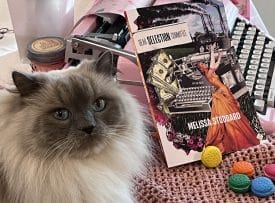

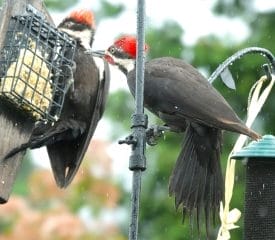

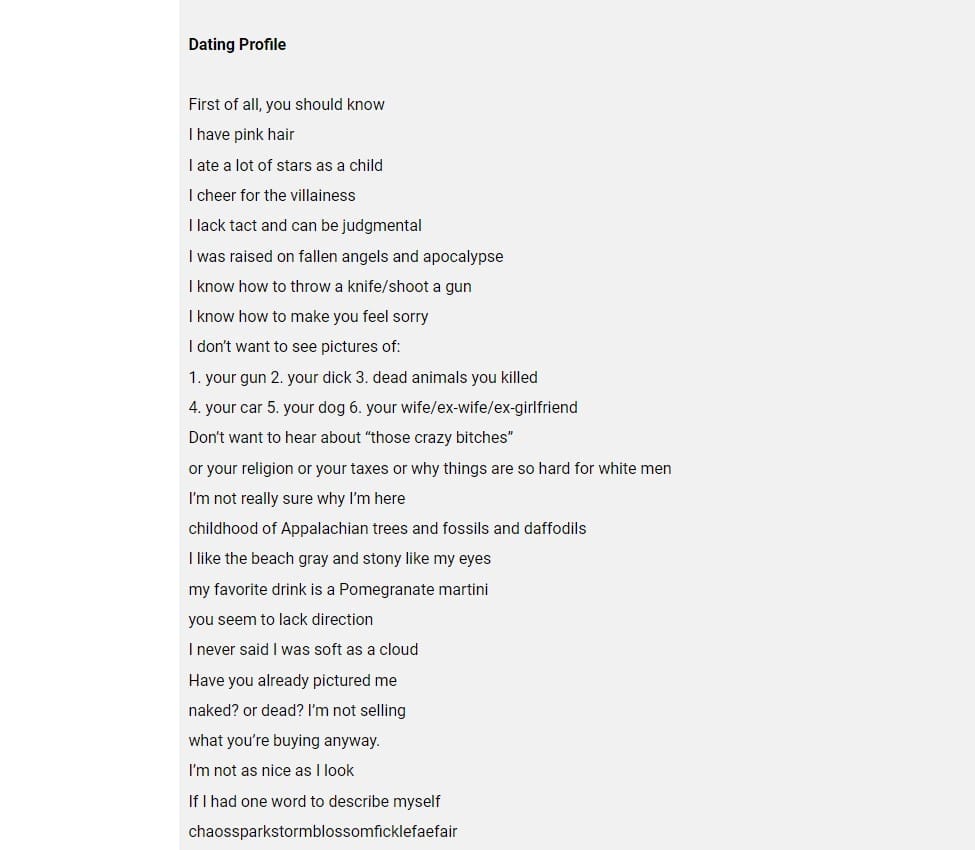


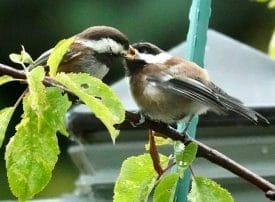

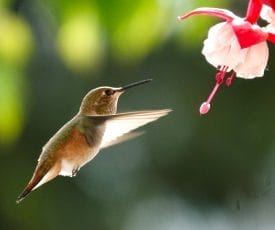















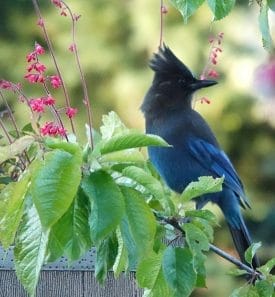





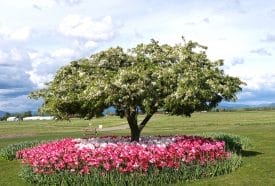

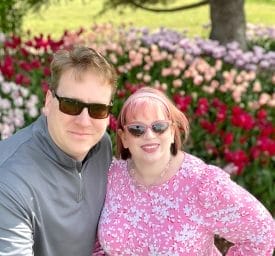








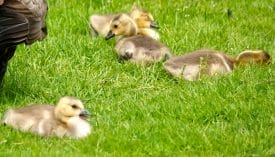







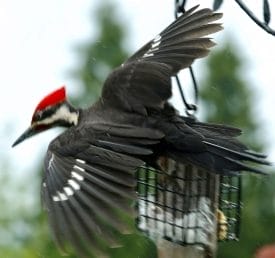







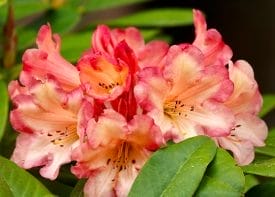

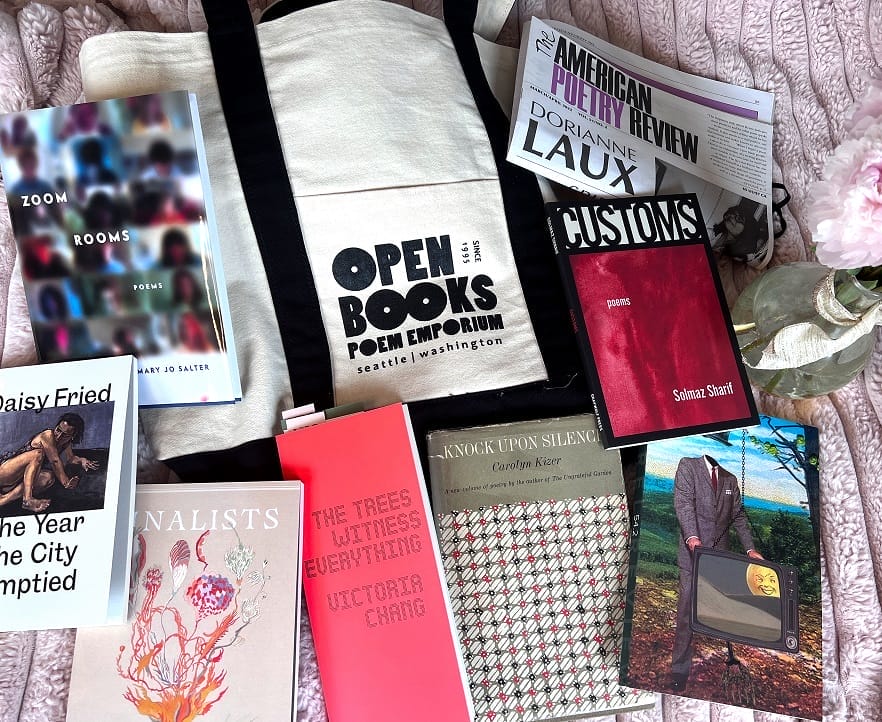
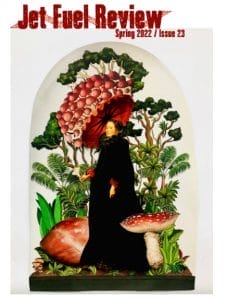

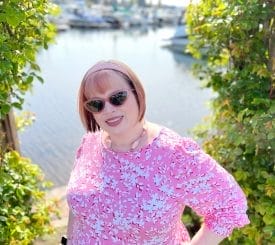




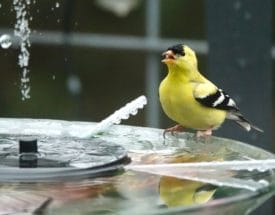
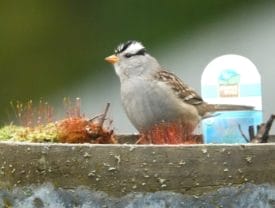








 Jeannine Hall Gailey served as the second Poet Laureate of Redmond, Washington and the author of Becoming the Villainess, She Returns to the Floating World, Unexplained Fevers, The Robot Scientist’s Daughter, and winner of the Moon City Press Book Prize and SFPA’s Elgin Award, Field Guide to the End of the World. Her latest, Flare, Corona from BOA Editions, was a finalist for the Washington State Book Award. She’s also the author of PR for Poets, a Guidebook to Publicity and Marketing. Her work has been featured on NPR’s The Writer’s Almanac, Verse Daily and The Year’s Best Fantasy and Horror. Her poems have appeared in The American Poetry Review, Poetry, and JAMA.
Jeannine Hall Gailey served as the second Poet Laureate of Redmond, Washington and the author of Becoming the Villainess, She Returns to the Floating World, Unexplained Fevers, The Robot Scientist’s Daughter, and winner of the Moon City Press Book Prize and SFPA’s Elgin Award, Field Guide to the End of the World. Her latest, Flare, Corona from BOA Editions, was a finalist for the Washington State Book Award. She’s also the author of PR for Poets, a Guidebook to Publicity and Marketing. Her work has been featured on NPR’s The Writer’s Almanac, Verse Daily and The Year’s Best Fantasy and Horror. Her poems have appeared in The American Poetry Review, Poetry, and JAMA.






